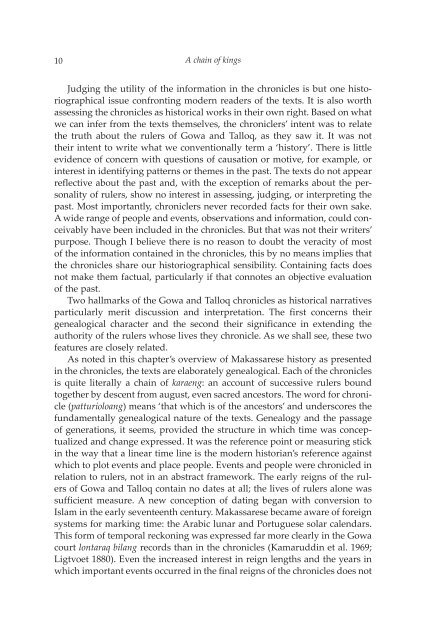A CHAIN OF KINGS - Books and Journals
A CHAIN OF KINGS - Books and Journals
A CHAIN OF KINGS - Books and Journals
You also want an ePaper? Increase the reach of your titles
YUMPU automatically turns print PDFs into web optimized ePapers that Google loves.
10<br />
A chain of kings<br />
Judging the utility of the information in the chronicles is but one historiographical<br />
issue confronting modern readers of the texts. It is also worth<br />
assessing the chronicles as historical works in their own right. Based on what<br />
we can infer from the texts themselves, the chroniclers’ intent was to relate<br />
the truth about the rulers of Gowa <strong>and</strong> Talloq, as they saw it. It was not<br />
their intent to write what we conventionally term a ‘history’. There is little<br />
evidence of concern with questions of causation or motive, for example, or<br />
interest in identifying patterns or themes in the past. The texts do not appear<br />
reflective about the past <strong>and</strong>, with the exception of remarks about the personality<br />
of rulers, show no interest in assessing, judging, or interpreting the<br />
past. Most importantly, chroniclers never recorded facts for their own sake.<br />
A wide range of people <strong>and</strong> events, observations <strong>and</strong> information, could conceivably<br />
have been included in the chronicles. But that was not their writers’<br />
purpose. Though I believe there is no reason to doubt the veracity of most<br />
of the information contained in the chronicles, this by no means implies that<br />
the chronicles share our historiographical sensibility. Containing facts does<br />
not make them factual, particularly if that connotes an objective evaluation<br />
of the past.<br />
Two hallmarks of the Gowa <strong>and</strong> Talloq chronicles as historical narratives<br />
particularly merit discussion <strong>and</strong> interpretation. The first concerns their<br />
genealogical character <strong>and</strong> the second their significance in extending the<br />
authority of the rulers whose lives they chronicle. As we shall see, these two<br />
features are closely related.<br />
As noted in this chapter’s overview of Makassarese history as presented<br />
in the chronicles, the texts are elaborately genealogical. Each of the chronicles<br />
is quite literally a chain of karaeng: an account of successive rulers bound<br />
together by descent from august, even sacred ancestors. The word for chronicle<br />
(patturioloang) means ‘that which is of the ancestors’ <strong>and</strong> underscores the<br />
fundamentally genealogical nature of the texts. Genealogy <strong>and</strong> the passage<br />
of generations, it seems, provided the structure in which time was conceptualized<br />
<strong>and</strong> change expressed. It was the reference point or measuring stick<br />
in the way that a linear time line is the modern historian’s reference against<br />
which to plot events <strong>and</strong> place people. Events <strong>and</strong> people were chronicled in<br />
relation to rulers, not in an abstract framework. The early reigns of the rulers<br />
of Gowa <strong>and</strong> Talloq contain no dates at all; the lives of rulers alone was<br />
sufficient measure. A new conception of dating began with conversion to<br />
Islam in the early seventeenth century. Makassarese became aware of foreign<br />
systems for marking time: the Arabic lunar <strong>and</strong> Portuguese solar calendars.<br />
This form of temporal reckoning was expressed far more clearly in the Gowa<br />
court lontaraq bilang records than in the chronicles (Kamaruddin et al. 1969;<br />
Ligtvoet 1880). Even the increased interest in reign lengths <strong>and</strong> the years in<br />
which important events occurred in the final reigns of the chronicles does not









![Am HaSefer [Volk des Buches] - Books and Journals](https://img.yumpu.com/20648352/1/174x260/am-hasefer-volk-des-buches-books-and-journals.jpg?quality=85)







